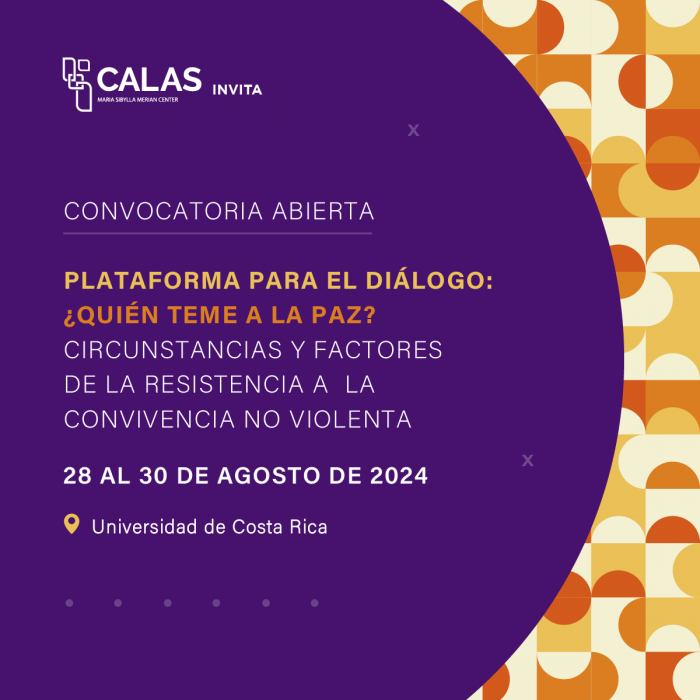The Regional Center for Central America and the Caribbean of the Maria Sibylla Merian Center for Advanced Latin American Studies, the Centro de Investigaciones Históricas de América Central (CIHAC) of the Universidad de Costa Roca (UCR), in cooperation with the Institute for Interdisciplinary Research on Conflict and Violence of the University of Bielefeld (IKG), the Center for Ibero-American Studies of the University of Heidelberg (HCIAS) and the Center for Social Research (UCR), invite researchers to participate in the Platform for Dialogue/International Symposium "Who is afraid of peace? Circumstances and factors of resistance to non-violent coexistence", which will take place from August 28-30, 2024, at the University of Costa Rica.
Peace has always been one of the most important objectives of society and culture. It allows the expectation of prosperity, well-being and, in a general way, the development of human potentialities. However, it is evident that progress in excluding violence in relations between social groups and between states has been rather modest.
Taking this into consideration, the central question that the Platform proposes to discuss is: Why does resistance to peace persist despite the current conditions of global violence and inequality? Why do we insist on harming ourselves?
It could be assumed that these questions are trivial. In fact, one finds answers that are often based on assumptions and commonplaces, mainly of an anthropological nature. Therefore, the Symposium proposes to open the debate around the various forms and expressions of what could be called resistance to peace. The focus is less on violence than on peace. The question to be debated is why peace fails to be a priority of human experience. The proposal broadens the focus of peace studies; it does not seek to develop perspectives on peace from explanations of violence, but to deal with contexts, circumstances and motivations of opposition to peace. Ultimately, at the heart of the debate is a paradox: How can those who do not want peace be constrained to lay down their arms?
Given the current crisis scenario with several new armed conflicts taking place at regional levels, but with global implications, it is urgent to question the evident lack of willingness to live in peace. In this sense, the Platform proposes a critical dialogue between Latin America and Europe that explores the perspectives of both on the little eagerness for peace in the present. In this context, the new war scenarios in Europe and the world are perceived and reflected upon from Latin America.
In short, the invitation is to generate a transregional and transdisciplinary discussion on the epistemological, psychological, and cultural factors that undermine the desire to live in peace. In this sense, we intend to discuss three central aspects:
- First, it is proposed to discuss the roots of the different forms of skepticism and discredit that the notion of "peace" can provoke and also the circumstances in which it can seem not only unrealistic, but even dangerous.
- Secondly, it is the very aversion to peace, insofar as living in peace with the Other may not seem to be a desirable goal. What is at stake are subjectivities based on forms of aggressiveness and belligerence that do not admit tolerance. Nor do rejection and hatred leave room for non-violence, which is more worrying when the Other is not necessarily a "stranger" but someone with whom one is intimately related, as in the case of misogyny, where hatred is directed towards women with consequences of extreme violence that can lead to femicide. Similarly, hatred is directed towards non-heterosexual people and sexual diversities. Other alterities that are in question are cultural, ethnic, and religious differences, etc.
- Thirdly, it must be taken into account that peace can even inspire fear. Mistrust erodes the desire to welcome the Other. Moreover, insecurity can trigger forms of fear that do not admit the end of conflict. So-called "peace processes" can inspire fears that can cause even more damage. Thus, peace would not only be obstructed by fear, but, when it serves as a pretext for more violence, it would be its cause.
From the study of these three aspects, the objective of the event is to better understand how peace, an issue that is supposedly at the center of the desires of all humanity, becomes an object of mistrust, fear and repulsion. Hence, the call is addressed to researchers in the Social Sciences and Humanities who wish to contribute to the topics presented in empirical as well as theoretical and methodological terms.
Topics of interest:
- Conceptual and historical perspectives on the discrediting of and resistance to peace
- Cultures and aesthetics of peace and violence
- Democratization and peace in post-conflict societies
- Culture wars, neo-populisms and peace
- Pluriculturalities and ethnicities
- Humanitarianism and social rights
- Peace and Conflict Studies
- Affect research
- Postcolonial and decolonial studies
- Gender studies
- Religious studies
- Research on racism
- Human geography
Conditions for application
- Languages: English and Spanish
- Deadline for submission of proposals: March 3, 2024
- Fill in the application form with the title and summary of the proposal and a brief academic history indicating professional career and relevant publications.
An academic committee will select papers based on criteria of excellence. Applicants will be notified by April 15, 2024 of the decision on their proposal.
CALAS will cover lodging and living expenses. In addition, there will be a limited budget for travel expenses.
Contact us:
Maria Sibylla Merian Center for Advanced Latin American Studies (CALAS) - Central America and the Caribbean Regional Center
Email: sedesanjosecalas@gmail.com
Organizing Committee:
Yaatsil Guevara González (Heidelberg Center for Ibero-American Studies), Andreas Zick (IKG, Bielefeld University), David Díaz Arias (CALAS, University of Costa Rica), Joachim Michael (CALAS, Bielefeld University), Sebastián Martínez Fernández (CALAS, Leibniz University Hannover), Guillermo Navarro Alvarado (University of Costa Rica)


